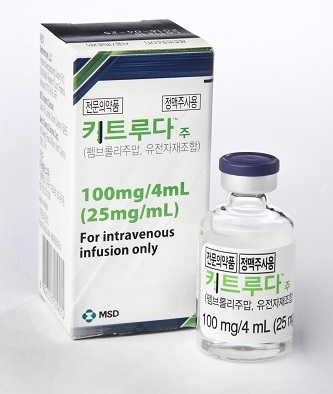MSD's anti-PD-1 immunotherapy Keytruda (pembrolizumab) has expanded its indication to include adjuvant therapy after surgery for early-stage non-small cell lung cancer (NSCLC).

MSD Korea said Friday that the Ministry of Food and Drug Safety (MFDS) on Tuesday approved Keytruda monotherapy as an adjuvant after surgery for patients with stage 1B (T2a≥4 cm), stage 2 or stage 3A NSCLC who have undergone resection and platinum-based chemotherapy.
Lung cancer is the number one killer cancer in Korea, and while surgery is the preferred treatment for patients with early-stage NSCLC, about 36 percent of patients experience a recurrence within five years of surgery. The five-year relative survival rate at the localized stage (78.5 percent) is also very low compared to survival rates for other major cancers, which can approach 90 percent or higher.
The latest indication approval is based on the KEYNOTE-091 study, which compared the efficacy of Keytruda monotherapy to placebo as adjuvant therapy after surgery in patients with stage 1B, stage 2, or stage 3A NSCLC, regardless of PD-L1 expression.
In the study, 1,177 patients received Keytruda or placebo once every three weeks for up to 18 treatments over one year following surgical resection. Some 86 percent of total participants had received platinum-based adjuvant chemotherapy after resection, and no neo-adjuvant chemotherapy was administered before surgery.
At a median follow-up of 35.6 months (27.1-45.5), Keytruda reduced patients' risk of recurrence by 24 percent (HR=0.76 [95 percent CI 0.63-0.91]; p=0.0014) compared to placebo. In addition, the study met its primary efficacy endpoint with a median disease-free survival (DFS) of 53.6 months (95 percent CI 39.2-NR) in the Keytruda arm), a nearly one-year improvement in DFS compared to 42 months (31.3-NR) in the placebo arm.
The second primary efficacy endpoint, DFS in patients with positive PD-L1 expression (TPS≥50 percent), was not significantly different compared to placebo. The safety profile of the Keytruda treatment arm was consistent with results from studies in patients with previously treated NSCLC who received Keytruda as monotherapy.
"With the approval of this indication, Keytruda's expanded portfolio in NSCLC now enables patients in Korea to experience the benefits of proven immuno-oncology treatment across a range of lung cancer treatment stages, including pre- and postoperative adjuvant therapy, postoperative adjuvant therapy, and consolidation therapy," said Lee Min-hee, executive vice president of MSD's Anticancer Business Unit in Korea.
Lee continued, “Keytruda remains at the forefront of lung cancer research through our extensive clinical research program, and we are committed to bringing innovative treatment benefits to lung cancer patients and contributing to positive outcomes."
With this approval, Keytruda's domestic indications for NSCLC have increased to six:
ㆍFirst-line metastatic NSCLC alone (TPS≥50 percent);
ㆍFirst-line non-squamous NSCLC in combination;
ㆍFirst-line squamous NSCLC in combination;
ㆍSecond-line metastatic NSCLC alone (TPS≥1 percent);
ㆍPre- and postoperative adjuvant therapy for patients with resectable NSCLC (combination therapy with chemotherapy as pre-operative adjuvant therapy, followed by Keytruda monotherapy as postoperative adjuvant therapy);
ㆍPostoperative adjuvant therapy (monotherapy) for patients with NSCLC treated with resection and platinum-based chemotherapy agents.
Related articles
- Keytruda’s approval for locally advanced cervical cancer gives green light for early treatment
- Why Keytruda is essential for treating early-stage triple-negative breast cancer
- Keytruda’s coverage expansion effectively ‘shelved’
- Immunotherapy Keytruda gets additional indication for treating high-risk cervical cancer
- Samsung Bioepis initiates global phase 3 study for Keytruda biosimilar
- Keytruda-Padcev combo approved for 1st-line treatment of locally advanced/metastatic urothelial carcinoma
- Celltrion's CT-P51 biosimilar to Keytruda receives FDA nod for phase 3 study
- GI Innovation, MSD to evaluate new immunotherapy+Keytruda in resistant cancers in phase 2 study

